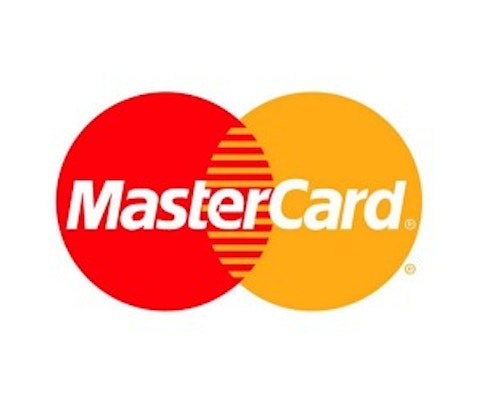MasterCard Inc (NYSE:MA) is prepared to take advantage of a growing middle class in the developing world, and this makes it a solid purchase for long-term investors.

MasterCard Inc (NYSE:MA) and The Western Union Company (NYSE:WU) on June 20 announced they would join efforts to allow small businesses to send payments internationally in 135 currencies. That’s just one more step in the firm’s advanced technology that is facilitating transactions in 210 countries and territories. Making overseas payments easier is a top priority of the firm, and that makes it worthy of a stock purchase.
MasterCard is a hidden gem
In taking a look at the company’s financials, it would appear the stock is fully valued. But the price doesn’t reflect the firm’s long-term revenue-generating potential. The PE ratio, at 25.7, indicates investors have moderate growth expectations for the firm. The consumer financial services industry averages a 14.5 PE ratio. Furthermore, the price-to-book ratio of 10.6 is one of the highest in the sector. These indicators tell me the company could be in for a couple years of little to no growth in the price of the stock, but as more global integration is achieved, the price will leap higher — and that integration will be reflected in steady increases in revenue from overseas transactions.
Competition’s position overseas
How is MasterCard Inc (NYSE:MA) better than Visa Inc (NYSE:V) and American Express Company (NYSE:AXP) at generating revenue throughout the world? Let’s take a look.
Visa Inc (NYSE:V) has 20 “buy” or better analyst ratings, compared to 10 “holds” and zero “sell” recommendations. However, the firm operates in 200 countries, 10 fewer than MasterCard Inc (NYSE:MA). And Visa doesn’t look to be making as much of a plunge into global integration, as the majority of company progress relates to integration on the domestic front. For example, the firm has integrated a real-time initiative that brings offer programs to members of ICBA Bancard.
The books are also not attractive for Visa. With a PE ratio of nearly 83, among the highest in the consumer financial services industry, the company is already very expensive. Also, the firm’s profit margin is only 21%, which would be stellar in most sectors, but MasterCard Inc (NYSE:MA) has nearly a 38% profit margin.
American Express is very American
American Express Company (NYSE:AXP) is known by travelers to have the least amount of usability overseas. The firm charges a 3% transaction fee, which is higher than MasterCard Inc (NYSE:MA) and Visa. Furthermore, the company hasn’t integrated with Travelex, which allows those who hold a MasterCard Inc (NYSE:MA) or Visa to load the card online.
Taking a look at the numbers, American Express is likely overpriced. The price-to-book ratio is 4.2, which is above average in the sector. Furthermore, the firm is the highest leveraged in the industry, with a debt-to-capital ratio of nearly 76%, which is in dangerous territory and could spell trouble if profits drop.
When it comes down to it
I choose MasterCard over Visa and American Express for the simple fact of the amount of attention each firm is giving the developing world. MasterCard is leagues ahead in this department. The trillion-dollar industry that is created by the developing nations – and increased travel – will result in large profits for American firms that know how to integrate internationally. But those who are confounded by bounded rationality will stick in the United States, where profit-generating potential is already nearly fully realized.
The article Mastercard Is Undervalued originally appeared on Fool.com.
Phillip Woolgar has no position in any stocks mentioned. The Motley Fool recommends American Express, MasterCard, and Visa. The Motley Fool owns shares of MasterCard. Phillip is a member of The Motley Fool Blog Network — entries represent the personal opinion of the blogger and are not formally edited.
Copyright © 1995 – 2013 The Motley Fool, LLC. All rights reserved. The Motley Fool has a disclosure policy.

